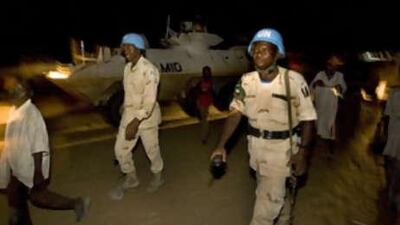EL FASHER, SUDAN // On a tour of United Nations peacekeeping bases in south Darfur last week, Gen Martin Luther Agwai saw a grim picture: armoured personnel carriers that lacked tyres; dysfunctional communications equipment; generators that were old and dying. And these were some of the better equipped bases in Darfur.
"There are some bases that don't have enough tents," said Gen Agwai, the commander of all the peacekeeping forces in Darfur. "Some bases have a problem with clean drinking water and food." The UN peacekeeping mission in Darfur, known as Unamid, is barely a year old, but expectations are high after UN peacekeepers joined African Union troops in Sudan's war-torn western region at the beginning of the year. Many of the peacekeepers wear their old green AU helmets wrapped in blue plastic bags, the colour of standard issue UN headgear.
The AU force was largely ineffective and underfunded. UN peacekeepers were only allowed into Darfur after months of international pressure on the Sudanese government, which is accused of supporting the mass slaughter of African tribes in the western region. The UN Security Council approved a force of 26,000 troops, but only about 8,000 have been sent in so far. The rest of the soldiers cannot be deployed until their equipment is on the ground, which could take months given the poor infrastructure in Sudan.
"We set impossible goals for ourselves," Gen Agwai said in an interview at Unamid headquarters in El Fasher, the capital of North Darfur province. "There was so much hope when we first deployed, but people didn't realise that this is a process not an event." The mission should be at 70 per cent of full strength by the end of the year, Gen Agwai said. Within 12 months, he expects to have the full 26,000-troop force on the ground. Meanwhile, the fighting continues in Darfur. The conflict, which began as a dispute between African villagers and Arab nomads over land and water rights, has entered its fifth year. More than 200,000 people have died, according to some estimates, and 2.5 million have fled to sprawling camps in the flat, dusty Sahel. UN military officials describe the current security situation as "cool and calm but unpredictable". The various rebel groups have splintered into factions, and large scale attacks are less common these days. Carjacking and banditry, however, are on the increase. "This is going to drag on like Somalia," said Mudawi Adam, director of Sudan Social Development Organisation, a local aid group. "The peacekeepers are there, but there is no peace to keep." Until Unamid is fully staffed, the soldiers, mostly from Nigeria, Rwanda and South Africa, remain vulnerable. In July, rebels attacked a convoy of peacekeepers, killing seven. Unamid lacks the air support to effectively carry out its mandate, UN military officials say. The force has repeatedly asked the international community for helicopter gunships, which are vital for patrolling the vast area of Darfur, roughly the size of Spain. But so far none have been delivered. "They are on our shopping list," said a UN military official who asked not to be named because he was not authorised to speak publicly. "It is hard to find a government willing to donate them." The peacekeeping force is also vulnerable to political influences. In June, the prosecutor of the International Criminal Court moved to indict Omar al Bashir, Sudan's president, on charges of genocide and war crimes in Darfur. If the court indicts Mr Bashir, Sudan could retaliate against the international community by expelling or even attacking the peacekeepers, analysts say. Darfurians have mostly welcomed the Unamid soldiers and have flocked to camps near peacekeeping bases, which offer protection from the Janjaweed, Arab militias that are backed by the Sudanese government. On their patrols, Unamid soldiers interact with displaced Sudanese to explain that they are there to provide security. But Unamid has not won over all of the locals. On Saturday night, during a regular peacekeeping patrol through the Otach Camp outside of Nyala, the capital of South Darfur, gunmen fired warning shots into the air as a show of force. Friction also remains between the Sudanese government and the UN peacekeeping mission. As the Unamid convoy of three lorries and two armoured personnel carriers headed back to Nyala from the camp, the peacekeepers were detained at a Sudanese army checkpoint for almost two hours. The Unamid soldiers tried to explain that they have a mandate to patrol at night, but the government forces released them only after receiving orders from a senior army commander. Top Sudanese officials know about Unamid's mission, but "that message doesn't filter down", said Peter Mabelebele, a Unamid military observer. "These are the challenges we face on the ground." mbrown@thenational.ae

